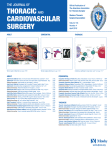
Predictors of survival in octogenarians after mitral valve surgery for degenerative disease: The Mitral Surgery in Octogenarians study
Objectives
An increasing number of octogenarians are referred to undergo mitral valve surgery for degenerative disease, and percutaneous approaches are being increasingly used in this subgroup of patients. We sought to determine the survival and its predictors after Mitral Valve Surgery in Octogenarians (MiSO) in a multicenter UK study of high-volume specialized centers.
Methods
Pooled data from 3 centers were collected retrospectively. To identify the predictors of short-term composite outcome of 30 days mortality, acute kidney injury, and cerebrovascular accident, a multivariable logistic regression model was developed. Multiple Cox regression analysis was performed for late mortality. Kaplan–Meier curves were generated for long-term survival in various subsets of patients. Receiver operating characteristic analysis was done to determine the predictive power of the logistic European System for Cardiac Operative Risk Evaluation.
Results
A total of 247 patients were included in the study. The median follow-up was 2.9 years (minimum 0, maximum 14 years). A total of 150 patients (60.7%) underwent mitral valve repair, and 97 patients (39.3%) underwent mitral valve replacement. Apart from redo cardiac surgery (mitral valve repair 6 [4%] vs mitral valve replacement 11 [11.3%], P = .04) and preoperative atrial fibrillation (mitral valve repair 79 [52.6%] vs mitral valve replacement 34 [35.1%], P < .01), there was no significant difference in terms of any other preoperative characteristics between the 2 groups. Patient operative risk, as estimated by logistic European System for Cardiac Operative Risk Evaluation, was lower in the mitral valve repair group (10.2 ± 11.8 vs 13.7 ± 15.2 in mitral valve replacement; P = .07). No difference was found between groups for duration of cardiopulmonary bypass and aortic crossclamp times. The 30-day mortality for the whole cohort was 13.8% (mitral valve repair 4.7% vs mitral valve replacement 18.6%; P < .01). No differences were found in terms of postoperative cerebrovascular accident (2% vs 3.1%; P = .9), acute kidney injury requiring dialysis (6.7% vs 13.4%; P = .12), and superficial or deep sternal wound infection (10% vs 16.5%, P = .17; 2% vs 3.1%, P = .67, respectively). The final multiple regression model for short-term composite outcome included previous cardiac surgery (odds ratio [OR], 4.47; 95% confidence interval [CI], 1.37-17.46; P = .02), intra-aortic balloon pump use (OR, 4.77; 95% CI, 1.67-15.79; P < .01), and mitral valve replacement (OR, 7.7; 95% CI, 4.04-14.9; P < .01). Overall survival for the entire cohort at 1, 5, and 10 years was 82.4%, 63.7%, and 45.5% (mitral valve repair vs mitral valve replacement: 89.9% vs 70.7% at 1 year, 69.6% vs 54% at 5 years, and 51.8% vs 35.5% at 10 years; P = .0005). Cox proportional hazard model results showed mitral valve replacement (hazard ratio, 1.88; 95% CI, 1.22-2.89; P < .01) and intra-aortic balloon pump use (hazard ratio, 2.54; 95% CI, 1.26-5.13; P < .01) to be independent predictor factors affecting long-term survival. Logistic European System for Cardiac Operative Risk Evaluation did not perform well in predicting early mortality (area under the curve, 0.57%).
Conclusions
In octogenarians, mitral valve repair for degenerative disease is associated with good survival and remains the gold standard, whereas mitral valve replacement is still associated with significant mortality. Logistic European System for Cardiac Operative Risk Evaluation was unable to predict early mortality in our cohort of patients. Larger international multicenter registries are required to optimize the decision-making process in such a high-risk subgroup.
